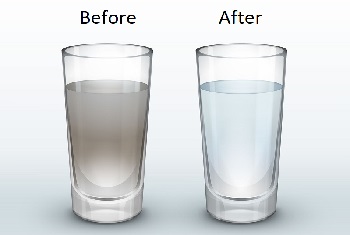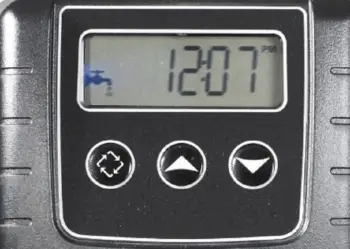Your water softener has been set to the same settings since it was installed and it seems to be working fine. You know that it softens your water, but could it be set too high?
When a water softener is set too high it will regenerate more than it needs to, which means it will use more salt and water than needed. Setting a water softener too high will not make the water softer or make the water softener work better.
By setting your water softener too high, you may be ensuring that your water will be properly softened but there are other factors that will be affected by setting your water softener too high that may cost you a lot of money and effort over the years.
How Setting Your Water Softener Too High Will Affect Your Water Softener.
- It WILL make your water softener regenerate more often
- It WILL make your water softener use more salt
- It WILL make your water softener use more water
- It WILL make your water softener wear out quicker
By setting your water softener higher than required, you are essentially telling the water softener to regenerate more often than it needs to in order to soften your untreated water.
If your water softener is regenerating more often, it will be using salt and water more often.
This means that you will have to add salt to the water softener brine tank more often than you really need to.
This also means that you will use more water from your well or have a higher water bill if your water comes from a municipal water source.
When a water softener is regenerating more often, it is also wearing out the parts of its control valve quicker which can shorten the life of your water softener.
How Setting Your Water Softener Too High Will Affect Your Water.
- It will NOT make your water “Extra” soft
- It will NOT make your water healthier
- It will NOT make your water taste better
- It will NOT make your water smell better
Having your water softener set just a little higher than it really needs to be is not a bad idea but it is really not very beneficial to your water unless the hardness or iron in your water tends to fluctuate.
A standard water softener is for removing hard minerals from your water and nothing more.
The water softener resin inside of a standard water softener simply does not have the capability to remove impurities from your water that would make the water safer to drink, taste better, or smell better.
When a water softener is set properly, it will remove all of the hardness from your water and provide softened water. Setting your water softener too high will not make your water softer, cleaner, taste better, or remove odors.
Check out this quick video about how a water softener regenerates its water softener resin.
Does Setting A Water Softener Higher Make It More Efficient?
Each time a properly set water softener regenerates, it does NOT remove ALL of the hardness and iron from its water softener resin.
If you take your car through an automatic car wash and notice that it missed a spot, you don’t pay for another complete car wash, do you?
No, you wash the spot by hand because spending the money for a whole nother car wash simply is not efficient.
This is a little like how a water softener regenerates (CLEANS) its resin.
The more resin that you regenerate in your water softener, the less efficient the brine solution will be.
In order to regenerate all of the water softener resin, you will use brine that will be going over the resin surface that has already been regenerated just so some of the brine reaches the resin that has not been regenerated yet.
Should You Set Your Water Softener Higher If Your Water Changes?
Setting your water softener slightly higher than it needs to be can be a good idea to provide a “Buffer” for fluctuating water hardness or iron in your water, but fluctuating water hardness and iron in water is not very common.
While significant fluctuations in water hardness or iron are not very common, they can occur if your water supply originates from several different origins or if it changes because of high amounts of rainfall or lack of rainfall.
Providing that there are no substantial fluctuations in your water hardness or iron in your water, a water softener will operate most efficiently when the hardness setting is set for your water hardness and any iron in your water if needed.
By setting your water softener correctly, it will only regenerate enough of its water softener resin to efficiently remove the hardness and iron to be removed from your water.
Because the ion exchange process that a water softener performs to remove hard minerals and iron from the water softener resin is not a perfectly efficient process, setting a water softener too high will make it operate less efficiently.
How Setting Your Water Softener Too High Will Waste Salt And Water.
When you set your water softener hardness higher than needed or manually set your water softener to regenerate more often than needed, you will naturally use more salt by adding more water to the water softener brine tank.
A water softener uses a process called Ion Exchange to remove hard ions from your water and hold them on its water softener resin until the water softener exchanges sodium ions from salt for the hard ions and rinses them to waste.
Because a water softener needs a strong dose of brine to regenerate its water softener resin, regenerating the resin before it has neared its maximum capacity will mean some of the sodium ions will pass through the resin without removing any hard ions.
That’s why a water softener should be set to the proper hardness setting to accommodate the actual amount of hardness of the water and any iron present in the water.
Will Setting Your Water Softener Higher Remove Odor From Your Water?
The water softener resin used in most water softeners simply does not have the ability to remove the particles or gasses from water that can cause the water to have an odor.
No matter how high you set your water softener, it will do nothing to remove odors from your water because it simply does not have the ability to do so.
Does Setting A Water Softener Higher Make Your Water Cleaner?

Because a water softener is NOT a sediment filter, it will not remove dirt or debris from your water regardless of how high you set the water softener.
When water runs through a water softener, the hard ions are drawn out of the water and collected on its water softener resin.
Dirt, debris, and sediment will pass through the water softener resin without being removed, therefore the water going into a standard water softener does not become cleaner when it comes out of the water softener.
Setting Your Water Softener Too High May Shorten The Life Of Your Water Softener.
The more a mechanical device operates, the quicker its mechanical parts wear out.
A water softener control valve is a mechanical device and in many cases, the water softener is the hardest working appliance in the home.
Although setting your water softener higher than needed may only make it operate slightly more than necessary, over many years that could mean that your water softener could operate hundreds of times more than it needed to.
Naturally, if your water softener operates more than it needs to, the parts will wear quicker which means that the control valve will not last as long as it could have.
Does Setting A Water Softener Too High Add More Salt To My Water?
Generally not! A properly operating water softener will rinse away the majority of the excess sodium from its resin tank at the end of its regeneration process.
Although some excess sodium being left over after regeneration is normal, it is normally very minimal, and setting your water softener to regenerate more often should not cause extra sodium in your water on a regular basis.
Why Do I Have To Set My Water Softener Anyway?
A water softener is simply a machine that contains water softener resin that removes hard ions from your water.
Your water softener does not know how often it will need to regenerate its water softener resin until you let the computer know your water hardness and any amount of iron that is present in the water.
Once you have determined your water hardness and iron, you can set your water softener correctly so it can properly remove them from your water.
After you have set your water softener appropriately, your water softener will know how much water can be used or how much time between regenerations.
This ensures that the water softener will regenerate often enough to provide you with soft and iron-free water without using more salt or water than is necessary.
What Should My Water Softener Be Set To?
Your water softener should be set to the amount of hardness in your water plus 4 for every 1 part per million of iron that is present in your water.
For more details, check out my article on how to properly set your water softener.
When Should You Set A Water Softener Higher Than Normal?
As the water softener resin in a water softener gets older, it will wear out just like any physical thing that makes contact with other surfaces.
When water softener resin wears it becomes less efficient and will not be able to remove hard ions from your water as efficiently as it used to.
Rather than replacing the resin as soon as it has become somewhat worn, you can set your water softener hardness slightly higher to compensate for the lack of efficiency of the worn resin.
This does mean that your water softener will use more salt and water than before, but if you only need to set the water softener slightly higher, the amount of additional salt and water that will be used will be minimal.
Some people think that they should set their water softener higher when they have an increase in water usage in the home, like when the kids are back from college or if you are having some long-term guests.
Most water softeners meter your water usage so changing your water softener setting for more water usage is not necessary.
But if your water softener regenerates based on time (every X amount of days), you may need to set it to regenerate more often to accommodate the extra water usage.
How Do I Change The Setting On My Water Softener?
In many cases, you will simply have to press a function button a few times to get to the “HARDNESS” setting and then press an up or down button to adjust the hardness up or down.

On manual water softeners that are set by days between regeneration, you may have to push in or pull out some pins to indicate how many days should be in between regenerations.

See your owner’s manual for detailed instructions on how to set your particular brand water softener.
If you don’t know your water hardness or how much iron is in your water, you can easily test your water yourself with a water hardness test kit or an iron test kit.

